Fleurs du Mal Magazine



Elke zomer slaat het Kunstenfestival Watou haar tenten op in het gelijknamige kunstdorpje net voorbij Poperinge, tegen de Franse grens aan.
Dichters en beeldend kunstenaars, aanstormend talent en gevestigde waarden, uit binnen- en uit buitenland zorgen telkens weer voor een wonderlijke ervaring in karaktervolle tentoonstellingsplekken: een verlaten herenhuis, de kelder van een brouwerij, … Een unieke kunstbeleving ontstaat uit het samengaan van beeldende kunst en poëzie in verrassende, karaktervolle ruimtes
De 40ste editie van het Kunstenfestival Watou staat voor beweging, meerstemmigheid, menselijkheid en intensiteit. ‘Watou 2021’ nodigt het publiek uit om te kijken, te lezen, te voelen, te reflecteren en te verbinden. Met de kunst, de poëzie, de natuur en met elkaar. Bezoekers bewegen zich tussen de drie hoeken van het parcours: Watou, het kunstdorp zelf, de Gasthuiskapel in het centrum van Poperinge en de nieuwe locatie, het Kasteel De Lovie, daartussen.
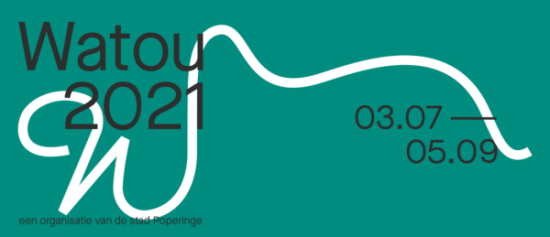
Kunst en poëzie dringen volgens de curatoren altijd meervoudige perspectieven op: “Heel wat vormen en inhoudelijke visies bestaan gelijktijdig en zonder hiërarchie. Er is geen groot gelijk, er is geen waarheid, er is alleen meerstemmigheid en die meerstemmigheid is een rijkdom.”
‘Watou 2021’ presenteert werk van 40 kunstenaars uit binnen- en buitenland, van verschillende generaties en met diverse achtergronden. De focus ligt op creaties, verrassende samenwerkingen en werk dat nooit eerder in Vlaanderen te zien was. De selectie poëzie weerspiegelt eenzelfde meerstemmigheid. Er is werk te lezen én te horen van 40 dichters: van overleden dichters tot gevestigde namen en jonge dichters en debutanten. Een aantal gedichten wordt ingelezen door ondermeer Wannes Cappelle, Zwangere Guy, Charlotte Adigéry en Lander Gyselinck.
Het programma bevat onder andere optredens en performances van Esther Kläs & Gustavo Gomes, Stefan Hertmans, Catharina van Eetvelde en Claron McFadden, IKRAAAN, CHVE / Colin H van Eeckhout, Fulco, Les Âmes Perdues, Marieke Lucas Rijneveld én Wannes Cappelle en Nicolas Callot en Koen Vanmechelen, curator van het experimentele traject Patchwork.
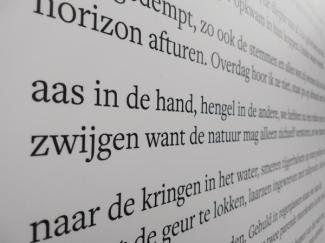 Als de wereld onder onze ogen aan het veranderen is en we nog niet kunnen benoemen wat we zien. Als alles wat we al decennia denken en voor waar aannemen onder druk staat. Als we ons, beroofd van onze zekerheden, onveilig voelen. Als de wereld complex is geworden, dan is er één plek waar al die onzekerheden, al dat geweld, al die onrust, al die complexiteit, en ook al die schoonheid en al dat verlangen samenkomen: de kunst. Daar is het dat we intens leven, tijdens het maken van kunst, het ervaren van kunst, en het herinneren van kunst. ‘Watou 2021’ is een uitnodiging om poëzie en beeldende kunst te ervaren met hersenen, zintuigen en gevoelens. Om vervuld te worden van die complexiteit, van die meerlagigheid.
Als de wereld onder onze ogen aan het veranderen is en we nog niet kunnen benoemen wat we zien. Als alles wat we al decennia denken en voor waar aannemen onder druk staat. Als we ons, beroofd van onze zekerheden, onveilig voelen. Als de wereld complex is geworden, dan is er één plek waar al die onzekerheden, al dat geweld, al die onrust, al die complexiteit, en ook al die schoonheid en al dat verlangen samenkomen: de kunst. Daar is het dat we intens leven, tijdens het maken van kunst, het ervaren van kunst, en het herinneren van kunst. ‘Watou 2021’ is een uitnodiging om poëzie en beeldende kunst te ervaren met hersenen, zintuigen en gevoelens. Om vervuld te worden van die complexiteit, van die meerlagigheid.

‘Watou 2021’ vertrekt vanuit de mens zelf. Wat is onze rol en positie in deze wereld? Wat is de impact van de recente transformaties op ons menszijn? Door de aanwas van technologie en artificiële intelligentie, maar ook door de crisis die we meemaken, leunen we niet alleen op onze rationele, maar ook op onze emotionele, spirituele, intuïtieve en biologische intelligentie.
Het vertrouwde werd vervangen door het confronterende en het oncomfortabele. Het daagt ons uit om onze blik open en dynamisch te houden. Met beweging als constante. Naar de ander en het andere.
Kunst en poëzie dringen altijd meervoudige perspectieven op: heel wat vormen en inhoudelijke visies bestaan gelijktijdig en zonder hiërarchie. Er is geen groot gelijk, er is geen waarheid, er is alleen meerstemmigheid en die meerstemmigheid is een rijkdom.
W A T O U 2 0 2 1
Kunstenaars
Arocha & Schraenen – Sarah & Charles – Leyla Aydoslu – Blauwhaus – Melanie Bonajo – Peter Buggenhout – N. Dash – Michael Dean – Lieven De Boeck – Ella de Burca – Anouk De Clercq – Edith Dekyndt – Bram Demunter – Tracey Emin – Bendt Eyckermans – Mekhitar Garabedian – Gijs Van Vaerenbergh – Nadia Guerroui – Esther Kläs – Margaret Lee – Bart Lodewijks & Jan Kempenaers – Ariane Loze – Ives Maes – Mark Manders – Neo Matloga – Vincent Meessen – Lucy Skaer – Socle – Joris Van de Moortel – Catharina Van Eetvelde – Luca Vanello – Johan Van Geluwe – Eva Vermandel – Leon Vranken – Ugo Rondinone – Zhang Yunyao
Dichters
Anellie David – Anna Enquist – Anne Vegter – Armando – Bernke Klein Zandvoort – Cees Nooteboom – Charlotte Van den Broeck – Chris Lomans – Dean Bowen – Dominique De Groen – Erwin Mortier – Estelle Boelsma – Geert Buelens – Gerrit Kouwenaar – Gertrude Starink – Hester Knibbe – J.V. Neylen – Jan Arends – Jan de Roek – Jos De Haes – Lamia Makaddam – Lara Taveirne – Laurine Verweijen – Levina van Winden – M. Vasalis – Marieke Lucas Rijneveld – Mattijs Deraedt – Miriam Van Hee – Nele Buyst – Paul Van Ostaijen Piet Gerbrandy – Poli Roumeliotis – René Van Gijsegem – Roelof ten Napel – Sanne Kabalt – Sasja Janssen – Stefan Hertmans – Thomas Möhlmann – Tonnus Oosterhoff – Yousra Benfquih
M E E R I N F O R M AT I E
en tickets
www.kunstenfestivalwatou.be

KUNSTENFESTIVAL WATOU
een organisatie van de stad POPERINGE
Grote Markt 1, 8970 Poperinge (BE)
kunstenfestival@poperinge.be
• fleursdumal.nl magazine
More in: #More Poetry Archives, - Book Lovers, Armando, AUDIO, CINEMA, RADIO & TV, Berger, Karl, Gerrit Kouwenaar, Historia Belgica, Literary Events, Marieke Lucas Rijneveld, Paul van Ostaijen, Paul van Ostaijen, Performing arts, Photography, Street Art, STREET POETRY, Street Poetry, Vasalis, M., Watou Kunstenfestival

The Charge
of the Light Brigade
Half a league, half a league,
Half a league onward,
All in the valley of Death
Rode the six hundred.
“Forward, the Light Brigade!
Charge for the guns!” he said:
Into the valley of Death
Rode the six hundred.
“Forward, the Light Brigade!”
Was there a man dismay’d?
Not tho’ the soldier knew
Some one had blunder’d:
Theirs not to make reply,
Theirs not to reason why,
Theirs but to do and die:
Into the valley of Death
Rode the six hundred.
Cannon to right of them,
Cannon to left of them,
Cannon in front of them
Volley’d and thunder’d;
Storm’d at with shot and shell,
Boldly they rode and well,
Into the jaws of Death,
Into the mouth of Hell
Rode the six hundred.
Flash’d all their sabres bare,
Flash’d as they turn’d in air
Sabring the gunners there,
Charging an army, while
All the world wonder’d:
Plunged in the battery-smoke
Right thro’ the line they broke;
Cossack and Russian
Reel’d from the sabre-stroke
Shatter’d and sunder’d.
Then they rode back, but not
Not the six hundred.
Cannon to right of them,
Cannon to left of them,
Cannon behind them
Volley’d and thunder’d;
Storm’d at with shot and shell,
While horse and hero fell,
They that had fought so well
Came thro’ the jaws of Death,
Back from the mouth of Hell,
All that was left of them,
Left of six hundred.
When can their glory fade?
O the wild charge they made!
All the world wonder’d.
Honor the charge they made!
Honor the Light Brigade,
Noble six hundred!
Alfred Lord Tennyson
(1809-1892)
The Charge of the Light Brigade
• fleursdumal.nl magazine
More in: *War Poetry Archive, Archive S-T, Archive S-T, Tennyson, Alfred Lord

The Fairies
Up the airy mountain,
Down the rushy glen,
We darent go a-hunting
For fear of little men;
Wee folk, good folk,
Trooping all together;
Green jacket, red cap,
And white owls feather!
Down along the rocky shore
Some make their home,
They live on crispy pancakes
Of yellow tide-foam;
Some in the reeds
Of the black mountain lake,
With frogs for their watch-dogs,
All night awake.
William Allingham
(1824 – 1889)
The Fairies
• fleursdumal.nl magazine
More in: Allingham, William, Archive A-B, Archive A-B

Kumulipo
(Hawaiian creation chant)
At the time that turned the heat of the earth,
At the time when the heavens turned and changed,
At the time when the light of the sun was subdued
To cause light to break forth,
At the time of the night of Makalii (winter)
Then began the slime which established the earth,
The source of deepest darkness.
Of the depth of darkness, of the depth of darkness,
Of the darkness of the sun, in the depth of night,
It is night,
So was night born
Kumulipo
O ke au i kahuli wela ka honua
O ke au i kahuli lole ka lani
O ke au i kukaiaka ka la.
E hoomalamalama i ka malama
O ke au o Makali’i ka po
O ka walewale hookumu honua ia
O ke kumu o ka lipo, i lipo ai
O ke kumu o ka Po, i po ai
O ka lipolipo, o ka lipolipo
O ka lipo o ka la, o ka lipo o ka po
Po wale hoi
Hanau ka po
Queen Liliʻuokalani
(1838-1917)
Kumulipo
Hawaiian creation chant
• fleursdumal.nl magazine
Queen Liliʻuokalani was born on September 2, 1838 in Honolulu, Hawaii, as Lydia Kamakaeha. She was proclaimed queen in 1891. The last monarch of Hawaii, her reign was short-lived due to a U. S. military-backed coup in 1893.
More in: # Classic Poetry Archive, Archive K-L, Archive K-L

On A Shadow In A Glass
By something form’d, I nothing am,
Yet everything that you can name;
In no place have I ever been,
Yet everywhere I may be seen;
In all things false, yet always true,
I’m still the same – but ever new.
Lifeless, life’s perfect form I wear,
Can show a nose, eye, tongue, or ear,
Yet neither smell, see, taste, or hear.
All shapes and features I can boast,
No flesh, no bones, no blood – no ghost:
All colours, without paint, put on,
And change like the cameleon.
Swiftly I come, and enter there,
Where not a chink lets in the air;
Like thought, I’m in a moment gone,
Nor can I ever be alone:
All things on earth I imitate
Faster than nature can create;
Sometimes imperial robes I wear,
Anon in beggar’s rags appear;
A giant now, and straight an elf,
I’m every one, but ne’er myself;
Ne’er sad I mourn, ne’er glad rejoice,
I move my lips, but want a voice;
I ne’er was born, nor e’er can die,
Then, pr’ythee, tell me what am I?
Most things by me do rise and fall,
And, as I please, they’re great and small;
Invading foes without resistance,
With ease I make to keep their distance:
Again, as I’m disposed, the foe
Will come, though not a foot they go.
Both mountains, woods, and hills, and rocks
And gamesome goats, and fleecy flocks,
And lowing herds, and piping swains,
Come dancing to me o’er the plains.
The greatest whale that swims the sea
Does instantly my power obey.
In vain from me the sailor flies,
The quickest ship I can surprise,
And turn it as I have a mind,
And move it against tide and wind.
Nay, bring me here the tallest man,
I’ll squeeze him to a little span;
Or bring a tender child, and pliant,
You’ll see me stretch him to a giant:
Nor shall they in the least complain,
Because my magic gives no pain.
Jonathan Swift
(1667 – 1745)
On A Shadow In A Glass
• fleursdumal.nl magazine
More in: Archive S-T, Archive S-T, Swift, Jonathan
A dark, no-holds-barred, and often hilarious collection from a prize-winning poet, veering between the poles of self and world.
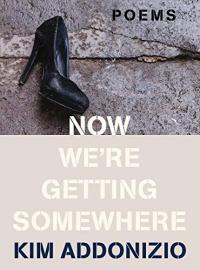 Kim Addonizio’s sharp and irreverent eighth volume, Now We’re Getting Somewhere, is an essential companion to your practice of the Finnish art of kalsarikännit―drinking at home, alone in your underwear, with no intention of going out. Imbued with the poet’s characteristic precision and passion, the collection charts a hazardous course through heartache, climate change, dental work, Outlander, semiotics, and more.
Kim Addonizio’s sharp and irreverent eighth volume, Now We’re Getting Somewhere, is an essential companion to your practice of the Finnish art of kalsarikännit―drinking at home, alone in your underwear, with no intention of going out. Imbued with the poet’s characteristic precision and passion, the collection charts a hazardous course through heartache, climate change, dental work, Outlander, semiotics, and more.
Combatting existential gloom with a wicked, seductive energy, Addonizio investigates desire, loss, and the madness of contemporary life. She calls out to Walt Whitman and John Keats, echoes Dorothy Parker, and finds sisterhood with Virginia Woolf.
Sometimes confessional, sometimes philosophical, these poems weave from desolation to drollery and clamor with raucous imagery: an insect in high heels, a wolf at an uncomfortable party, a glowing and self-serious guitar.
Kim Addonizio is a fiction writer, poet, and teacher. Her poetry collections include Tell Me, a finalist for the National Book Award, What Is This Thing Called Love, and Lucifer at the Starlite. She lives in Oakland, California.
Kim Addonizio
Now We’re Getting Somewhere
Poems
2021
Publisher: W. W. Norton & Company (March 16, 2021)
Language: English
Hardcover: 96 pages
ISBN-10: 0393540898
ISBN-13 : 978-0393540895
New poetry
Kim Addonizio
Now We’re Getting Somewhere
• fleursdumal.nl magazine
More in: #Editors Choice Archiv, #More Poetry Archives, Archive A-B, Archive A-B
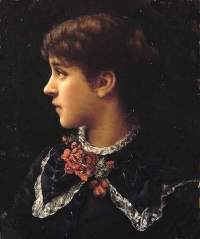
Ruines
« Et des larves de murs
sous des spectres de tours. »
VICTOR HUGO
J’ai vu comme l’on voit quelquefois dans un rêve,
Une immense Cité près d’une immense grève,
Avec des dômes d’or et des palais géants,
Des temples incrustés de mille diamants,
Que quatre grands Lions aux roussâtres crinières,
Menaçant le soleil de leur têtes altières,
Depuis quinze cents ans, immobiles, gardaient.
Et celle ville-là, des peuples l’habitaient.
Faisant retenir l’air de leurs clameurs joyeuses
Où l’Océan mêlait ses voix tumultueuses.
… Plus tard j’ai repassé devant cette cité,
Et voulant la revoir, je m’y suis arrêté ;
Mais à peine mes pas ont foulé sa poussière
Que devant mes regards elle s’est tout entière
Écroulée -et n’est plus qu’une ruine immense
Dont le cri des Vautours trouble seul le silence.
J’ai vu dans un jardin une brillante Fleur ;
De l’amour elle avait emprunté la couleur,
Et mille papillons voltigeant autour d’elle,
L’effleuraient en passant d’un baiser de leur aile.
Un Rossignol, caché dans ses légers rameaux.
Lui chantait, radieux, tous ses chants les plus beaux,
Et même osait parfois, plein d’allégresse folle.
Poser son bec rosé sur la rose corolle.
… Plus tard j’ai repassé devant le beau jardin.
Je voulais voir la fleur, connaître son Destin ;
Mais elle n’était plus que ruine légère
Et le rossignol mort reposait sur la terre.
J’ai vu l’Homme mortel, debout, superbe et grand,
Lever la tête au Ciel et marcher confiant ;
Beau comme le Soleil, tout baigné de lumière,
Il semblait être un dieu ! -n’était qu’un éphémère.
… Plus tard j’ai repassé pour le revoir encor.
Mais je n’ai plus trouvé qu’un fantôme de mort,
Une ruine affreuse en une solitude
Où quelques noirs Serpents vivent en quiétude.
J’ai vu tout l’Univers de splendeur rayonnant
Et le crus immortel, puisqu’il était si grand.
… Illusion ! lui-même, hélas ! ruine immense,
Errera quelque jour dans l’éternel Silence
Des déserts azurés, entraînant avec lui
Tous ces vivants d’hier, décombres aujourd’hui.
Et dans quelque infini, porte d’un autre Espace,
Il ira s’engouffrer sans laisser nulle trace.
Hélas ! et c’est en vain que j’ai partout cherché
Un lieu qui ne fût point par la mort entaché.
Partout sur mon chemin, des Spectres et des Ombres,
Des vestiges détruits sous des profondeurs sombres
Ont surgi devant moi, puis m’ont dit lentement :
« Il n’est que l’Inconnu qui ne soit pas néant. »
Juin 1879
Alice De Chambrier
(1861-1882)
Ruines
• fleursdumal.nl magazine
More in: Alice De Chambrier, Archive C-D, Archive C-D, Chambrier, Alice De

The Singing Man
I
He sang above the vineyards of the world.
And after him the vines with woven hands
Clambered and clung, and everywhere unfurled
Triumphing green above the barren lands;
Till high as gardens grow, he climbed, he stood,
Sun-crowned with life and strength, and singing toil,
And looked upon his work; and it was good:
The corn, the wine, the oil.
He sang above the noon. The topmost cleft
That grudged him footing on the mountain scars
He planted and despaired not; till he left
His vines soft breathing to the host of stars.
He wrought, he tilled; and even as he sang,
The creatures of his planting laughed to scorn
The ancient threat of deserts where there sprang
The wine, the oil, the corn!
He sang not for abundance.–Over-lords
Took of his tilth. Yet was there still to reap,
The portion of his labor; dear rewards
Of sunlit day, and bread, and human sleep.
He sang for strength; for glory of the light.
He dreamed above the furrows, ‘They are mine!’
When all he wrought stood fair before his sight
With corn, and oil, and wine.
Truly, the light is sweet
Yea, and a pleasant thing
It is to see the Sun.
And that a man should eat
His bread that he hath won;–
(So is it sung and said),
That he should take and keep,
After his laboring,
The portion of his labor in his bread,
His bread that he hath won;
Yea, and in quiet sleep,
When all is done.
He sang; above the burden and the heat,
Above all seasons with their fitful grace;
Above the chance and change that led his feet
To this last ambush of the Market-place.
‘Enough for him,’ they said–and still they say–
‘A crust, with air to breathe, and sun to shine;
He asks no more!’–Before they took away
The corn, the oil, the wine.
He sang. No more he sings now, anywhere.
Light was enough, before he was undone.
They knew it well, who took away the air,
–Who took away the sun;
Who took, to serve their soul-devouring greed,
Himself, his breath, his bread–the goad of toil;–
Who have and hold, before the eyes of Need,
The corn, the wine,–the oil!
Truly, one thing is sweet
Of things beneath the Sun;
This, that a man should earn his bread and eat,
Rejoicing in his work which he hath done.
What shall be sung or said
Of desolate deceit.
When others take his bread;
His and his children’s bread?–
And the laborer hath none.
This, for his portion now, of all that he hath done.
He earns; and others eat.
He starves;–they sit at meat
Who have taken away the Sun.
II
Seek him now, that singing Man.
Look for him,
Look for him
In the mills,
In the mines;
Where the very daylight pines,–
He, who once did walk the hills!
You shall find him, if you scan
Shapes all unbefitting Man,
Bodies warped, and faces dim.
In the mines; in the mills
Where the ceaseless thunder fills
Spaces of the human brain
Till all thought is turned to pain.
Where the skirl of wheel on wheel,
Grinding him who is their tool,
Makes the shattered senses reel
To the numbness of the fool.
Perisht thought, and halting tongue
(Once it spoke;–once it sung!)
Live to hunger, dead to song.
Only heart-beats loud with wrong
Hammer on, – – How long?
. . How long? – – How long?
Search for him;
Where the crazy atoms swim
Up the fiery furnace-blast.
You shall find him, at the last,–
He whose forehead braved the sun,–
Wreckt and tortured and undone.
Where no breath across the heat
Whispers him that life was sweet;
But the sparkles mock and flare,
Scattering up the crooked air.
(Blackened with that bitter mirk,–
Would God know His handiwork?)
Thought is not for such as he;
Naught but strength, and misery;
Since, for just the bite and sup,
Life must needs be swallowed up.
Only, reeling up the sky,
Hurtling flames that hurry by,
Gasp and flare, with Why–Why,
. . . Why? . . .
Why the human mind of him
Shrinks, and falters and is dim
When he tries to make it out:
What the torture is about.–
Why he breathes, a fugitive
Whom the World forbids to live.
Why he earned for his abode,
Habitation of the toad!
Why his fevered day by day
Will not serve to drive away
Horror that must always haunt:–
. . . Want . . . Want!
Nightmare shot with waking pangs;–
Tightening coil, and certain fangs,
Close and closer, always nigh …
. . . Why? . . . Why?
Why he labors under ban
That denies him for a man.
Why his utmost drop of blood
Buys for him no human good;
Why his utmost urge of strength
Only lets Them starve at length;–
Will not let him starve alone;
He must watch, and see his own
Fade and fail, and starve, and die.
* * * *
. . . Why? . . . Why?
* * * *
Heart-beats, in a hammering song,
Heavy as an ox may plod,
Goaded–goaded–faint with wrong,
Cry unto some ghost of God
. . . How long? . . . How long?
. . . . . . How long?
III
Seek him yet. Search for him!
You shall find him, spent and grim;
In the prisons, where we pen
These unsightly shards of men.
Sheltered fast;
Housed at length;
Clothed and fed, no matter how!–
Where the householders, aghast,
Measure in his broken strength
Nought but power for evil, now.
Beast-of-burden drudgeries
Could not earn him what was his:
He who heard the world applaud
Glories seized by force and fraud,
He must break,–he must take!–
Both for hate and hunger’s sake.
He must seize by fraud and force;
He must strike, without remorse!
Seize he might; but never keep.
Strike, his once!–Behold him here.
(Human life we buy so cheap,
Who should know we held it dear?)
No denial,–no defence
From a brain bereft of sense,
Any more than penitence.
But the heart-beats now, that plod
Goaded–goaded–dumb with wrong,
Ask not even a ghost of God
. . . . . . How long?
When the Sea gives up its dead,
Prison caverns, yield instead
This, rejected and despised;
This, the Soiled and Sacrificed!
Without form or comeliness;
Shamed for us that did transgress;
Bruised, for our iniquities,
With the stripes that are all his!
Face that wreckage, you who can.
It was once the Singing Man.
IV
Must it be?–Must we then
Render back to God again
This His broken work, this thing,
For His man that once did sing?
Will not all our wonders do?
Gifts we stored the ages through,
(Trusting that He had forgot)–
Gifts the Lord requir’d not?
Would the all-but-human serve!
Monsters made of stone and nerve;
Towers to threaten and defy
Curse or blessing of the sky;
Shafts that blot the stars with smoke;
Lightnings harnessed under yoke;
Sea-things, air-things, wrought with steel,
That may smite, and fly, and feel!
Oceans calling each to each;
Hostile hearts, with kindred speech.
Every work that Titans can;
Every marvel: save a man,
Who might rule without a sword.–
Is a man more precious, Lord?
Can it be?–Must we then
Render back to Thee again
Million, million wasted men?
Men, of flickering human breath,
Only made for life and death?
Ah, but see the sovereign Few,
Highly favored, that remain!
These, the glorious residue,
Of the cherished race of Cain.
These, the magnates of the age,
High above the human wage,
Who have numbered and possesst
All the portion of the rest!
What are all despairs and shames,
What the mean, forgotten names
Of the thousand more or less,
For one surfeit of success?
For those dullest lives we spent,
Take these Few magnificent!
For that host of blotted ones,
Take these glittering central suns.
Few;–but how their lustre thrives
On the million broken lives!
Splendid, over dark and doubt,
For a million souls gone out!
These, the holders of our hoard,–
Wilt thou not accept them, Lord?
V
Oh, in the wakening thunders of the heart,
– – The small lost Eden, troubled through the night,
Sounds there not now,–forboded and apart,
Some voice and sword of light?
Some voice and portent of a dawn to break?–
Searching like God, the ruinous human shard
Of that lost Brother-man Himself did make,
And Man himself hath marred?
It sounds!–And may the anguish of that birth
Seize on the world; and may all shelters fail,
Till we behold new Heaven and new Earth
Through the rent Temple-vail!
When the high-tides that threaten near and far
To sweep away our guilt before the sky,–
Flooding the waste of this dishonored Star,
Cleanse, and o’erwhelm, and cry!–
Cry, from the deep of world-accusing waves,
With longing more than all since Light began,
Above the nations,–underneath the graves,–
‘Give back the Singing Man!’
Josephine Preston Peabody
(1874 – 1922)
The Singing Man
• fleursdumal.nl magazine
More in: # Classic Poetry Archive, Archive O-P, Archive O-P
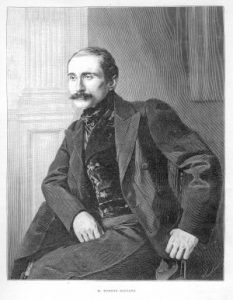
Les Rois Mages
Ils perdirent l’étoile, un soir ; pourquoi perdon
L’étoile ? Pour l’avoir parfois trop regardée,
Les deux rois blancs, étant des savants de Chaldée,
Tracèrent sur le sol des cercles au bâton.
Ils firent des calculs, grattèrent leur menton,
Mais l’étoile avait fuit, comme fuit une idée.
Et ces hommes dont l’âme eût soif d’être guidée
Pleurèrent, en dressant des tentes de coton.
Mais le pauvre Roi noir, méprisé des deux autres,
Se dit ‘Pensons aux soifs qui ne sont pas les nôtres,
Il faut donner quand même à boire aux animaux.’
Et, tandis qu’il tenait son seau d’eau par son anse,
Dans l’humble rond de ciel où buvaient les chameaux
Il vit l’étoile d’or, qui dansait en silence.
Edmond Rostand
(1868-1918)
Les Rois Mages
• fleursdumal.nl magazine
More in: Archive Q-R, Archive Q-R, CLASSIC POETRY

Gebruiksaanwijzing
Zegslieden zeggen niets. Ze geven hun meester door.
O, wat zijn ze bang in het donker. Als ze zelf redenen
om te zwijgen moeten verzinnen, met de kreet van de
wraak in de keel. Scherprechters wachten in hun ijle
dromen op bevelen. Ach, die macht over de taal.
Gebruik haar gerust want gemuilkorfd door luwte
blijven toch de lichtgelovigen. Goed onder woorden.
Bert Bevers
Gebruiksaanwijzing
Gedicht
Verschenen in Eigen terrein, Uitgeverij WEL, Bergen op Zoom, 2013
• fleursdumal.nl magazine
More in: Archive A-B, Archive A-B, Bevers, Bert

The Song
That day, in the slipping of torsos and straining flanks on the bloodied ooze of fields plowed by the iron,
And the smoke bluish near earth and bronze in the sunshine floating like cotton-down,
And the harsh and terrible screaming,
And that strange vibration at the roots of us…
Desire, fierce, like a song…
And we heard
(Do you remember?)
All the Red Cross bands on Fifth avenue
And bugles in little home towns
And children’s harmonicas bleating
America!
And after…
(Do you remember?)
The drollery of the wind on our faces,
And horizons reeling,
And the terror of the plain
Heaving like a gaunt pelvis to the sun…
Under us – threshing and twanging
Torn-up roots of the Song…
Lola Ridge
(1873-1941)
The Song
• fleursdumal.nl magazine
More in: Archive Q-R, Archive Q-R, Ridge, Lola

WEEMOED
Uit de bloemen en de bomen
Stijgt een onbepaalde klacht
‘s Avonds, als ik zit te dromen
En gedwee m’n weemoed wacht.
En uit alle de gewesten
Rijst een zang van droefenis
Omdat ginds in ‘t rode Westen
‘t Zonnelicht aan ‘t sterven is…
‘k Zit naar ‘t sparrenbos te staren,
Waar die stralen stervend zijn;
‘k Wou zo geern’ wat glans vergaren
Voor mijn droevig zielekijn.
Maar ze daalt reeds in de bomen
En haar stralen houdt ze bij,
Z’heeft mijn blijheid meegenomen
En wat weemoed liet ze mij.
Stil, o stille… ‘k Voel ze komen
Milde weemoedsmelodij,
Zachte, wondre weeldestromen
Brengen mij gedichtjes bij.
Stil, o stille, ‘k hoor d’akkoorden
Klagen door de schemering.
‘k Voel geen tranen, ‘k weet geen woorden,
‘k Vind alleen herinnering.
Dank, o zon, dat gij mijn zangen,
Als g’in ‘t leven slapen gaat,
Voor dees grauwe gasthuisgangen
Mild en goed behouden laat.
Dank, o weemoed, dat gij dromen
Zendt door mijne droefenis,
Wijl dees donkere dagen komen
Wijl mijn zon gestorven is…
Alice Nahon
(1896-1933)
Weemoed
• fleursdumal.nl magazine
More in: Archive M-N, Archive M-N, Nahon, Alice
Thank you for reading Fleurs du Mal - magazine for art & literature